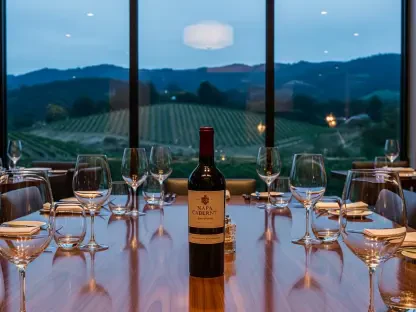The 2024 Boutique Hotel Owners Conference, organized by the Boutique & Luxury Lodging Association (BLLA), recently concluded, offering a wealth of insights into the evolving boutique hospitality landscape. The event, themed “The Mycelium Network,” brought together industry leaders, independent hoteliers, and experts to discuss strategies for navigating operational challenges, adapting to changing guest preferences, and managing regulatory and financial complexities. This gathering stood as a beacon for the boutique hotel’s community, illuminating the path forward in these tumultuous times with in-depth discussions on long-term planning, operational creativity, and the necessity of fostering community connections. Each session and panel discussion reinforced several key themes and anticipated trends that will shape the future of the industry, providing valuable takeaways for all attendees.
Economic Pressures and Rising Costs
One of the predominant themes at the conference was the impact of economic pressures on boutique hotels. With rising interest rates and construction costs, hoteliers face significant challenges in developing and renovating properties. Experts at the conference emphasized the importance of securing local partnerships and avoiding brokerage markets to mitigate these challenges. They also highlighted the need for long-term planning and smart budgeting to maintain profitability in a tightening market.
Construction costs have surged by over 25% in the past six years, making it crucial for hoteliers to rethink their operational efficiencies. By focusing on local resources and partnerships, boutique hotels can navigate these economic pressures more effectively. The discussions underscored the importance of strategic financial planning and the need to adapt to the changing economic landscape. This long-term strategic approach is essential to counterbalance the financial strains, ensuring that the boutique hotels’ unique charm and value proposition remain intact amidst the economic challenges.
Additionally, the conference underscored the importance of local partnerships not just in construction and renovation but also in daily operations. Leveraging these relationships can help boutique hoteliers reduce costs and enhance operational efficiencies by procuring goods and services locally, which often results in cost savings and a boost to the local economy. Establishing symbiotic relationships with local suppliers, contractors, and community organizations is pivotal, as it fosters community engagement while supporting the hotel’s operational needs, ultimately contributing to a sustainable business model in the face of economic uncertainties.
Operational Creativity and Authenticity
Running a small hotel presents unique advantages and challenges, and the conference underscored the importance of operational creativity and authenticity. Small hotel owners were encouraged to focus on hands-on management to create intimate and authentic guest experiences, which larger brands often struggle to replicate. This approach not only enhances guest satisfaction but also sets boutique hotels apart in a competitive market.
However, managing food and beverage (F&B) components remains a significant challenge for small hotel owners. The conference highlighted the need to align sales, marketing, and day-to-day operations to enhance operational efficiencies. Leveraging the inherent authenticity of boutique hotels can help create memorable guest experiences and drive repeat business. This operational authenticity often derives from the personal touch that small hoteliers can offer, personalized attention to guest needs, and a genuine connection, which are invaluable in creating a loyal customer base.
The discussions elaborated on the importance of integrating storytelling into the hotel’s branding strategy, which can significantly boost guest engagement and loyalty. By narrating the unique story behind the boutique hotel, including its origins, community ties, and unique offerings, hoteliers can deepen the connection with guests and curate an enriching experience that transcends the traditional lodging encounter. This narrative approach seamlessly weaves operational creativity and authenticity into the guest experience, ensuring a unique value proposition that larger chains cannot replicate and fostering a niche market appeal that stands out in the crowded hospitality market.
Adapting Food and Beverage Models
Food and beverage offerings are a vital yet often overlooked segment of boutique hotel operations. The conference stressed the importance of reimagining F&B models to drive profitability. Optimizing layouts and labor management can help control costs while meeting shifting consumer preferences, such as the decline in alcohol consumption. Panelists urged hoteliers to see F&B as a core part of the guest experience, capable of creating memorable moments that resonate with guests and the local community.
Aligning menus with contemporary health and wellness trends can further enhance the guest experience and drive profitability. By adapting their F&B models, boutique hotels can better meet guest needs and stand out in a competitive market. The discussions brought to light the necessity of integrating local flavors and sustainable practices in F&B operations to satiate the growing demand for authentic and environmentally-conscious dining experiences. This strategic pivot not only positions the hotel favorably with health-conscious and environmentally-aware consumers but also supports local producers, crafting a symbiotic relationship that enriches the overall guest experience.
Furthermore, panelists highlighted strategies for maximizing the use of hotel spaces to enhance F&B operations, such as transforming underutilized areas into dynamic dining venues or pop-up concepts. This approach not only maximizes revenue per square foot but also keeps the offerings fresh and exciting for guests. By continually innovating and adapting to changing consumer preferences, boutique hotels can cultivate a robust F&B program that enhances the guest experience, drives repeat business, and fortifies their market position amidst the competitive landscape.
Wellness and Sustainability
The rise of wellness tourism is transforming the boutique hotel industry, with travelers increasingly seeking holistic, health-focused experiences. The Sensei panel at the conference delved into how hoteliers can incorporate wellness into their offerings through sustainable practices and evidence-based wellness programs. This focus aligns with growing consumer consciousness about health and the environment. Incorporating wellness and sustainability into hotel operations not only differentiates boutique hotels in a competitive market but also meets the evolving preferences of modern travelers.
Incorporating wellness and sustainability into their offerings can significantly elevate boutique hotels’ appeal to modern travelers who prioritize health and environmental responsibility. The Sensei panel stressed the importance of adopting a holistic approach to wellness that goes beyond traditional spa services to include activities such as yoga, meditation, and fitness programs. By offering a comprehensive wellness experience, hoteliers can attract a broader range of guests and enhance their market position. Sustainable practices, such as using eco-friendly materials, reducing waste, and supporting local communities, further bolster the hotel’s reputation as a responsible and desirable destination.
Additionally, sustainability initiatives, such as energy-efficient systems, waste reduction programs, and locally sourced materials, align with the growing consumer demand for environmentally responsible travel options. Creating a serene and health-focused environment requires a thoughtful approach to design and operations, integrating natural elements and biophilic designs that connect guests with nature and enhance their overall well-being. By embracing these trends, boutique hotels can set themselves apart as leaders in the wellness tourism market, elevating their brand and attracting a dedicated clientele who value health, wellness, and sustainability.
New Business Models and Membership Strategies
A key trend discussed at the conference was the shift from traditional hospitality models to membership-based experiences. These models offer alternative revenue streams and build lasting guest loyalty through personalized, exclusive experiences. Developing membership programs, whether through subscription services or VIP loyalty initiatives, can foster a sense of belonging and community. Membership strategies can drive repeat business and enhance long-term profitability for boutique hotels.
By offering personalized and exclusive experiences, hoteliers can create a loyal customer base and differentiate themselves from competitors. The conference highlighted the potential of these new business models to transform the boutique hospitality landscape. Hoteliers who successfully implement membership strategies can expect to see increased guest retention, higher occupancy rates, and more stable revenue streams. This shift represents a paradigm change, moving away from the traditional transactional model to one that emphasizes long-term relationships and sustained engagement with guests.
Furthermore, membership models provide opportunities for boutique hoteliers to gather valuable data on guest preferences and behaviors, enabling them to tailor offerings and experiences to meet the unique needs of their members. Personalized communication and exclusive benefits can significantly enhance the guest experience, fostering a deep sense of loyalty and community. This proactive approach to guest engagement not only drives repeat business but also positions the hotel as a preferred destination for discerning travelers seeking unique and personalized experiences.
Managing Growth Amid Industry Shifts
Managing growth in a rapidly evolving industry presents significant challenges for boutique hoteliers. The conference discussions emphasized the importance of balancing the preservation of authenticity with the expansion of operations or renovation of existing properties. Topics such as ADA compliance and shifting guest preferences were also addressed. Panelists advised hoteliers to focus on innovation while maintaining careful financial and operational planning for sustainable growth. By staying true to the core values of boutique hospitality—authenticity, creativity, and community—hoteliers can navigate industry shifts and achieve long-term success.
The conference provided valuable insights into managing growth and adapting to the changing landscape of the boutique hotel industry. Attendees were encouraged to embrace innovation while remaining grounded in the unique value propositions that define their brand. This delicate balance is crucial for sustaining growth without compromising the distinctive charm and authenticity that guests have come to expect from boutique hotels. Proactive measures such as regular property assessments, strategic investments in technology, and continuous staff training ensure that boutique hotels can adapt to industry changes while maintaining high standards of service and guest satisfaction.
Additionally, the importance of compliance with accessibility standards and evolving guest expectations was underscored as critical components of sustainable growth. Ensuring that properties are ADA compliant not only broadens the guest demographic but also reflects a commitment to inclusivity and accessibility. The discussions highlighted the necessity of thorough planning and vigilant management practices to navigate growth efficiently, ensuring that boutique hotels remain competitive and relevant in an ever-evolving market. Hoteliers were advised to approach growth with a strategic mindset, balancing short-term gains with long-term sustainability to secure their position in the boutique hospitality sector.
The Mycelium Network: Fostering Collaboration and Connectivity
The Mycelium Network, the conference’s overarching theme, served as a metaphor for the interconnectedness of boutique hoteliers, their guests, and local communities. Much like the mycelium network in nature, which allows plants to share resources and thrive, the boutique hospitality sector thrives on collaboration and shared knowledge. The event reinforced the idea that by fostering deep connections with the local environment and leveraging community resources, boutique hotels can offer unique, authentic experiences that resonate deeply with modern travelers.
The discussions highlighted the importance of building strong relationships with local suppliers, artisans, and community organizations to create a rich tapestry of experiences that reflect the hotel’s unique character and the local culture. This approach not only enhances the guest experience but also supports the local economy and fosters a sense of belonging and community. By integrating local elements into their offerings, boutique hotels can create a distinctive identity that sets them apart from competitors and resonates deeply with guests seeking authentic and immersive experiences.
The Mycelium Network concept also emphasized the value of collaboration among hoteliers, sharing best practices, and learning from each other’s experiences to navigate the industry’s challenges together. This spirit of collaboration and connectivity fosters a supportive community where boutique hoteliers can thrive, innovate, and grow. The conference underscored the importance of leveraging this network to stay informed about industry trends, access valuable resources, and build meaningful partnerships that contribute to the hotel’s success. By embracing the Mycelium Network’s principles, boutique hotels can cultivate a thriving ecosystem that benefits guests, hoteliers, and the broader community.
Conclusion
Running a small hotel comes with unique benefits and challenges, as highlighted at a recent conference. Small hotel owners were advised to embrace hands-on management to deliver personal and authentic guest experiences that large hotel chains often can’t match. This strategy boosts guest satisfaction and helps boutique hotels stand out in a competitive industry.
One major challenge is managing food and beverage (F&B) services. The conference stressed the importance of aligning sales, marketing, and daily operations to improve efficiency. By leveraging their authenticity, small hotels can create memorable experiences that encourage repeat business. The personal touch small hoteliers provide, including personalized attention and genuine connections with guests, is key to building a loyal customer base.
Furthermore, the conference emphasized incorporating storytelling into a hotel’s branding strategy to enhance guest engagement and loyalty. By sharing the unique story of the hotel—its origins, community ties, and distinct offerings—hoteliers can forge deeper connections with guests and offer a rich experience that goes beyond traditional lodging. This narrative approach blends creativity and authenticity, providing a distinctive value that large chains can’t replicate and appealing to a niche market in the crowded hospitality industry.









